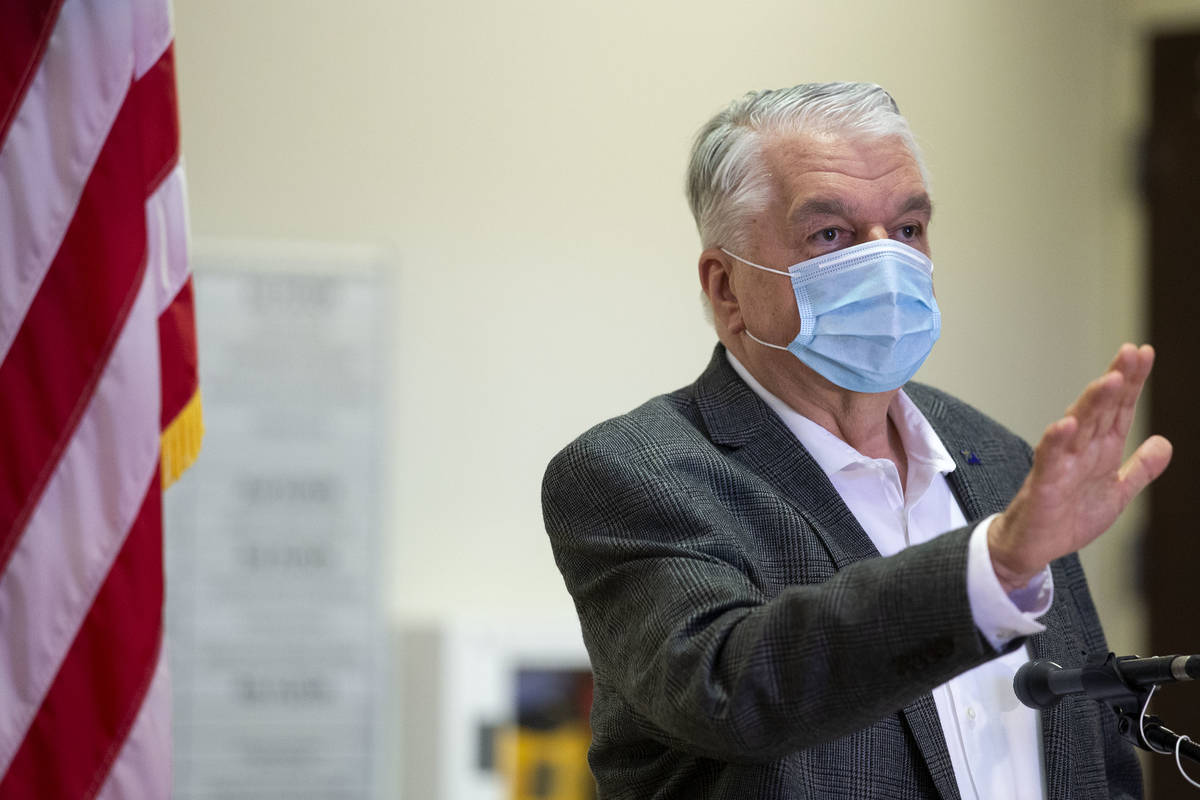Sisolak extends Nevada residential eviction moratorium
With Nevada facing a potential eviction crisis, Gov. Steve Sisolak announced Monday that the state’s eviction moratorium will be extended an additional 45 days.
The reason for the extension is to allow counties to pay out short-term rental assistance to landlords, give courts more time to implement a new mediation program that was approved by the Legislature in August and to develop electronic filing options, and to give the state more time to reduce the backlog of unemployment claims, Sisolak said in a news conference Monday evening.
“We will allow more time for these programs to be fully implemented and give assistance to those who need it most during this difficult time,” Sisolak said.
The move came one day before the moratorium was set to expire, and is the second time that the governor has extended the expiration date. But Sisolak noted that “we can’t keep continuing this moratorium forever.”
A projected 249,700 people in Clark County were at risk of eviction if the legal proceedings had been allowed to resume Tuesday, according to a report from the Guinn Center, a Las Vegas research group, and the COVID-19 Eviction Defense Project in Denver.
Sisolak halted residential evictions based on nonpayment of rent on March 29, in the early weeks of the COVID-19 pandemic, to protect Nevadans hit by financial troubles amid the economic collapse caused by the virus.
He issued a new directive in June that called for a gradual lifting of the moratorium, with residential evictions resuming Sept. 1. More than 25,000 people have inquired about the program, which will probably use all of the program’s current funding, the state treasurer’s office said in mid-August.
The governor said Monday that they will also put an additional $10 million in CARES Act money toward that rental assistance program that will go toward directly paying landlords for eligible renters, which is in addition to the $60 million that state and local governments have already allocated.
The extension and additional funds should help some renters, but the state is still likely to see a surge of evictions when the moratorium is eventually lifted, Nancy Brune, executive director of the Guinn Center, said Monday.
The $70 million that the state has put toward the rental assistance program is still likely well short of what will be needed to truly address the issue, Brune said. The Guinn Center estimates that the state would need as much as $260 million for those payments by the end of the year. And the National Low Income Housing Coalition estimates that the state could need between $845 million and $1.2 billion in emergency rental assistance to keep families in their homes from May of this year to June 2021.
More time needed
During a special legislative session in August, lawmakers passed Senate Bill 1, which allows the courts to set up a program to stay eviction proceedings for up to 30 days in favor of alternative dispute resolution between landlords and tenants. But that program is not yet ready, Sisolak said.
“I’m disappointed that the court could not get the mediation program in place quicker, but they couldn’t,” Sisolak said.
To speed up the process, Sisolak’s directive will waive the required 60-day waiting period for regulations to be adopted. That means that once the regulations for the program are drafted, they can then be adopted at a public meeting soon after. The governor said he expects that to be done by the end of September.
“It is critical that tenants and landlords continue to work together to come to resolutions,” he said.
Unemployment claims
The extension will also give Nevada more time in its continual battle to reduce the backlog of unemployment insurance claims in the state hardest hit by job losses during the COVID-19 economic shutdown.
“We do not want Nevadans being evicted while waiting on a determination of their case,” Sisolak said.
Chris Bishop, president of the trade association Nevada Realtors, said in a statement that the group was “disappointed” in Sisolak’s extension because it will put a burden on property owners who rely on those rent payments as their income, and criticized him for waiting until the day before the moratorium was set to expire before announcing it.
“Many of these property owners are retirees, people living on fixed incomes and mom-and-pop landlords who own one or two homes and rely on this rental income to support themselves and their families. Many of them will now have no recourse or way to cover their own expenses,” Bishop said.
Sisolak and members of his office worked with the agencies and other stakeholders over the weekend and into Monday morning in an attempt to avoid the extension.
“Unfortunately, we didn’t get there,” he said.
Sisolak said he is confident that 45 days will be enough time for the various agencies and entities to ensure that those programs are up and running.
Staff writer Shea Johnson contributed to this report. Contact Capital Bureau Chief Colton Lochhead at clochhead @reviewjournal.com. Follow @ColtonLochhead on Twitter.




















































